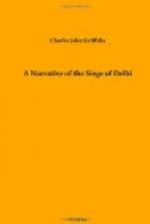A striking instance of the feeling which animated officers and men in the troublous times took place some time afterwards at Delhi. An officer of my regiment was on guard at the Ajmir Gate, and on one occasion sent to the Governor some men whom he had captured while they were in the act of escaping from the city. These men were released; but on a second occasion three men were taken, and the officer, deeming it useless to forward them for punishment to the usual authority, called out a file of his soldiers, placed the prisoners in the ditch outside the Ajmir Gate, shot them, and then, digging a hole, buried them at the place of execution.
For a long period after the capture of Delhi executions by hanging were of common occurrence in the city, and the hands of the old provost-sergeant were full. Disguised sepoys and inhabitants taken with arms in their possession had short shrift, and were at once consigned to the gallows, a batch of ten one day suffering death opposite the Kotwali.
In the beginning of October two more reputed sons of the old King were shot by sentence of court-martial. They had commanded regiments of the rebel army, and were foremost in the revolt, even joining in the massacre of our people. The 60th Rifles and some Goorkhas formed the firing party, and took, strange to say, such bad aim that the provost-sergeant had to finish the work by shooting each culprit with a pistol. Nothing could have been more ill-favoured and dirty than the wretched victims; but they met their fate in silence and with the most dogged composure.
September 28.—Accompanied by our Adjutant and some other officers, I rode out to Taliwarra and Kishenganj on September 28. These suburbs were a mass of ruins, but enough was left intact to show the immense strength of the enemy’s position at the former place. Batteries had been erected at every available spot, strongly fortified and entrenched, and one in particular which had raked the right of our position was perfect in every detail, and was guarded by a ditch, or rather nallah, forty feet deep.
We passed through the large caravanserai, the scene of the conflict during the memorable sortie of July 9, and when in the course of our inspection in the enclosure a ludicrous event occurred. An officer who had been shot through the leg on that day, recognizing the place where he had received his wound, dismounted from his horse, and stood on the very spot. He was in the act of explaining events, and describing his sensations when shot, when suddenly he made a jump in the air, uttering a cry of pain, and commenced rubbing his legs, first one and then the other. We burst into laughter at the antics of our friend, who, we imagined, had been seized with a fit of madness quite at variance with his usual quiet demeanour, and jokingly asked him what was the matter. Still writhing with pain, and engaged in his involuntary saltatory exercise, he pointed to a swarm of wasps




